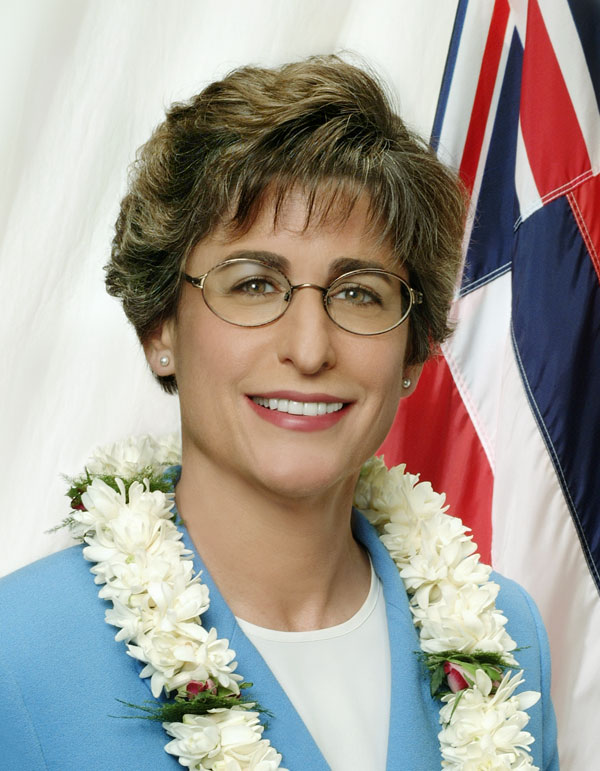|
|
Gov.
Linda Lingle (R-Hawaii)
|
|
Special Dossier:
Decision 5767

Few Jewish Republicans Are Running For
Office
The "Chosen" Representatives.
-- Jonathan E. Kaplan
Republicans have boasted in recent years that Jewish Americans, who traditionally vote for and contribute money to Democrats, are supporting the GOP in greater numbers both financially and at the polls.
But the Republican Party has made little if any headway recruiting Jewish candidates to run for office under the party's banner.
There are 20 Jewish Democratic challengers running for House and Senate seats this fall but only two Jewish Republican challengers, according to data compiled by the National Jewish Democratic Council (NJDC).
In Congress today, Senators Norm Coleman (MN) and Arlen Specter (PA) and Rep. Eric Cantor
(VA) are the only Jewish Republicans. The only Jewish GOP governor is Hawaii's Linda
Lingle.
Just two Jewish Republicans ran for the House this cycle: Gary Applebaum
(MD), a physician, and Alan Fine (MN), a businessman and state legislator. Applebaum lost a bid to compete for Rep. Ben Cardin's (D-MD) seat; Fine will face Democrat Keith Ellison, a Muslim, to try to succeed retiring Rep. Martin Sabo (D-MN).
Jewish Republicans are running for the Senate only as long-shots: Alan
Schlesinger (Conn.) and Eddie Pirkowski (Hawaii). However, Sen. Joe Lieberman (Conn.) and Rep. Bernie Sanders (Vermont), who are Jewish, are both running as independent candidates. In Texas, musician and author Kinky Friedman is running for governor. Barbara Ann Radnofsky, a Texas Democrat, is running for senate against Sen. Kay Bailey Hutchison (R-Texas).
The lack of Jewish Republican candidates may suggest that the party's strong stance in support of Israel, particularly since the terrorist attacks on Sept. 11, 2001, may not have been as effective as the hierarchy hoped.
?If Republicans have overcome their historic problems with the Jewish community, then it begs the question, "Where are their Jewish candidates"? said David Goldenberg, spokesman for the NJDC. ?The majority of Jews don't feel comfortable in the Republican Party, which champions the causes of the extreme right wing."
Although Ronald Reagan received 40 percent of the Jewish vote in 1980, Jews typically vote Democratic to a much greater extent. In 1992, former President George Bush won just 11 percent of the Jewish vote (Ross Perot captured 9 percent) and, in 1996, former Sen. Bob Dole (R-Kan.) won 16 percent. In 2000, President Bush won 19 percent of the Jewish vote. Four years later, President Bush fared slightly better against Sen. John Kerry (D-Mass.) winning 24 percent of the Jewish vote.
"We have made incremental gains and we hope that tide changes," said Tara Wall, a spokeswoman at the Republican National Committee.
While Jewish voters cast ballots for Democrats, they also overwhelmingly run for office as Democrats.
The 22 Jewish House Democrats and three Jewish Democratic senators are not only running in major cities where historically Jews have had a disproportionate influence on politics, some like Gary Trauner, Gabby Giffords and John Yarmuth, are challenging GOP incumbents in Wyoming, Arizona and Kentucky, respectively.
Even in the most Republican of states, there are few Jewish Republicans. In the Alaska state legislature, for example, there are five Jewish lawmakers, four Democrats and one Republican. State Rep. Ethan Berkowitz (D), the nominee for lieutenant governor, would become the first Jew elected to statewide office in Alaska.
?We're the frozen chosen," Berkowitz joked, "the Yarmulke caucus." He said being Jewish is "not an issue of any consequence."
Sandy Maisel, a political scientist at Colby College and author of a book on Jews in American politics, said,
"Few Jewish officeholders sought or retain office because of their views on Israeli politics. They are supporters of Israel to be sure,
but other issues dominate their political agendas."
Cantor, the GOP chief deputy whip, said, "We're seeing a shift in the younger generation in the traditional bent of American Jews.
I have seen several new, young, fresh faces looking at running for office and getting involved."
He cited several Jewish Republicans, including Josh Mandel, a candidate for Ohio's state House, and state Sen. Adam Hasner (Fla.), who are emblematic of that trend.
Jewish Republican political strategists admitted that it would take time to develop candidates for elected office.
?There's not a lot of a back bench," said Matt
Brooks, executive director of the Republican Jewish Coalition. ?As we get more growth, the natural evolution will be more of those folks running for office."
Jason Isaacson, director of government affairs at the American Jewish Committee, said, ?There's not a tidal wave, but there's a movement? of American Jews willing to support Republican candidates, noting that,
"these things take time to develop."
He added that the number of Jewish Republicans running for office ?won't shift overnight."
And at the state level, there has been some recent progress in electing Jewish Republicans. While Hasner is the only Jewish Republican in Florida's state Senate, there are three Jewish Republicans in the state House.
In the Bush Administration, chief of staff Josh Bolten and Republican National
Committee Chairman Ken Mehlman are Jewish.
|

